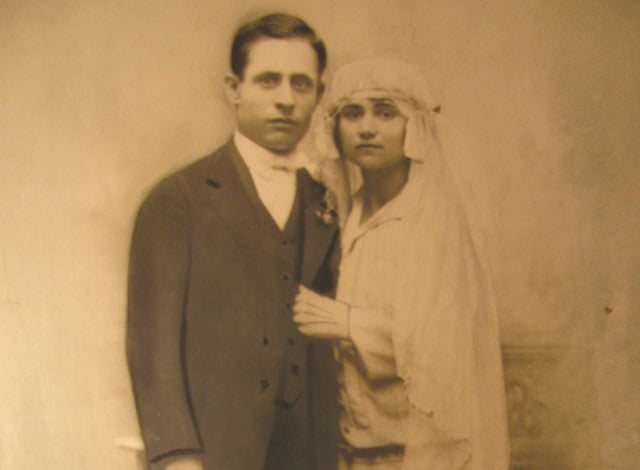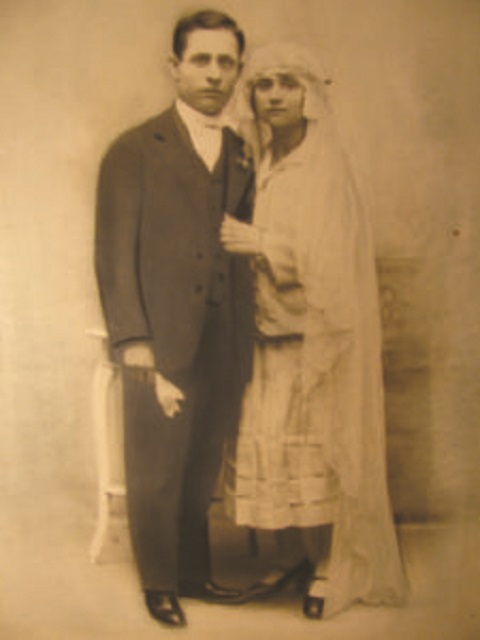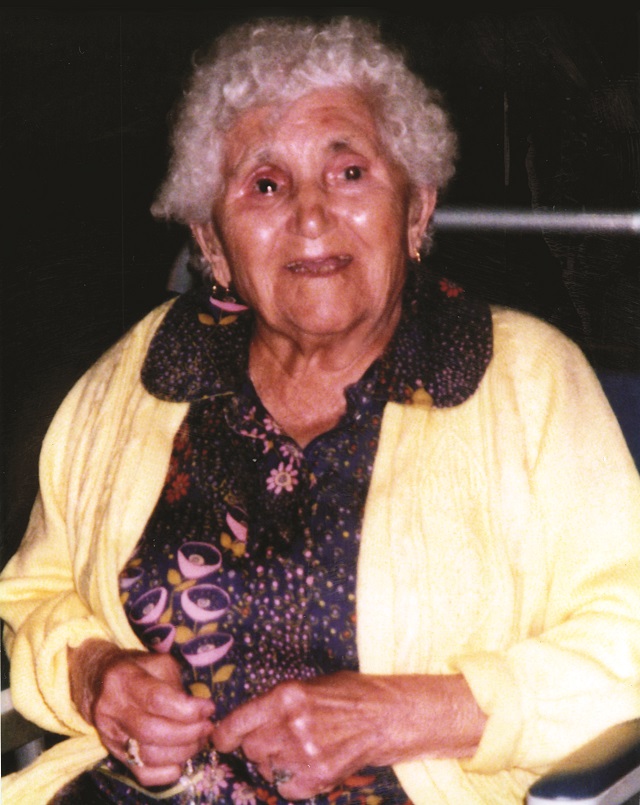Daybreak on April 24, 2021 arrived with the birds singing outside my window, blue skies and sunshine…and a feeling of anticipation that felt like I was holding my breath all morning. When I read the statement – the long-awaited recognition of the Armenian Genocide by President Joe Biden – I read it again and exhaled. It was a ray of light during a time of intense darkness…arriving 106 years after the start of the horrific events.
My colleague Leeza and I sprang into action to break the news to our community. And then it was broadcast on television. Mom, the daughter of survivors, my husband Ara and I, both grandchildren of survivors, watched the news on a television that’s mounted on a wall opposite pictures of my grandmother Margaret Garabedian DerManuelian and her sister Mariam, both survivors, and my father Haig, also a child and grandchild of survivors. The symbolism of that emotionally overwhelming moment was not lost on us. In much the same way that we remember where we were and what we were doing when historic events, both joyful and tragic, have occurred, I knew I would never forget this day of remembrance and what we were doing when Pres. Biden fulfilled a promise to the Armenian people.
A few short months ago, Dr. Jermaine McCalpin, a warrior for truth and justice who fights with our community for reckoning and reparations, published a book that has touched my heart, Sown in Tears: Reflections on Grief and Loss. “Whether our loss is fresh and recent or long and indelible, we miss our loved ones. We feel an overwhelming presence of their absence,” he writes in the selection “Guilt of the Bereaved.” These words spoke to the transgenerational trauma that has defined our lives as descendants of a genocide denied. I have heard many people say that “we stand on the shoulders of giants” as we continue to work toward real justice for the great crime of the genocide. My giant, the one I was privileged to have as my guide and grandmother for four decades, stood just four feet, 10 inches tall (on a good day). She was a survivor. Every day, her absence is palpable, but on April 24, 2021, I felt her awesome presence.
Read also
When Grandma died on March 25, 2002, I became unable to write anything of a personal nature. I was enrolled in a masters program at the time, so writing was a necessity, but as it was research-based, I was able to suppress my emotions as I pursued a goal that had been encouraged by my grandmother. One year later, however, I was given an assignment that required me to reckon with my emotions. In an English course designed to demonstrate the writing process for prospective teachers, we were instructed to write about a personal life-altering event. I wrote about the loss of my giant of a survivor.
We may not know yet the full impact of Pres. Biden’s statement on our continued pursuit of justice, but in keeping with the emotion of the day and its personal meaning for our community, I offer a slightly abridged version of my original essay – for my grandmother, Margaret Garabedian DerManuelian. I have never shared this essay publicly. Borrowing from Dr. Khatchig Mouradian, whose book The Resistance Network serves as inspiration and motivation for me and many others, this is also for all the survivors on whose shoulders we stand and for whom our work continues.
Faith, Strength and Dignity: A Grandmother’s Legacy
“Unh,” she says with a small smile of satisfaction on her face. Grandma has succeeded at sitting in her chair with her feet on the floor. She cannot do it alone, but this tiny woman with so much dignity allows my mother to hold her hands in front and my father to hold her up under her arms from the back until she reaches her chair. The chair is a short trip around her bed. We find out later that day that putting feet to floor is a common desire of those in their final hours or days. This is the last thing Grandma would be able to do before dying two days later. Then, the flurry of horrible, dreaded activity begins.
As our priest [Der Gomidas Baghsarian] arrives at our home to offer her communion, and my entire family is trying to control the flood of emotions in the room, my mind drifts over a lifetime with this woman who is truly a hero to me. As I recollect so many life-changing events with Grandma, I realize the profound impact this death will have on us all, and most especially, my mother (her daughter).
Grandma arrived in this country as a young bride after surviving the Armenian Genocide. Thanks to my brother, we have a video and written record of her story, although I must say it’s an impossible story to forget. At the age of about six or seven, Grandma was taken to be a slave in a Turkish household. She suffered many beatings at the hands of her master, the “agha.”
She used to love telling this particular story, I think, to show us just how plucky and strong she was. One day, Grandma was making the dough for some bread (she was already known for her bread making, even at such a young age). As she was pouring out the flour, some baby mice fell into the bowl. “Now, what do I do?” she asked herself. “If I tell the ‘agha’ about the mice, he’ll beat me, and if I throw away the flour, he’ll beat me. So, I decided to knead the mice into the dough, bake it, and let the bastards eat it!” She used to end the story with such relish and a mischievous smile that it brought smiles and a sense of pride to all of us who listened to her.
Oh no! Now, the ambulance has arrived to take Grandma to hospice. It is more than I can bear. What to do? Where to turn? How would my daughter handle this? She loves her Nana more than she can say, and when she gets home, I’ll have to tell her that Nana has gone to hospice and all that this means. I can barely comprehend what is happening. How will I ever have the strength to tell Dalita? Then, I remember Grandma’s strength, her dignity and her pride, in her family, her faith and her heritage. I know now that I’ll be able to tell Dalita in the most loving way possible, because that’s what Grandma would expect and want.
Another memory comes to me – another of so many reminding me of the legacy created by this tiny 95-year-old woman. “You know,” she said, “when the soldiers came to take the men, we didn’t know what happened. Then, someone came and told us that my father may be down by the river. My older sister decided to take me, imagine me, only six years old, to see what had happened. When we got there, we found my father. But his head was not attached to his body. We went and told our mother that they (the Turks) had killed many men, but not him. We don’t know if she believed us or not.” Grandma used to tell us this story so we would know the truth about what had happened. How did she find the strength? How did they go on? “Faith,” she would answer.
Strength. Faith. Dignity. All of these words and attributes come to me as I rush to hospice to be with Grandma. I must be strong for Grandma. I must be strong for my daughter. I have to be strong for Mom. Please, God, give me the strength!
I walk into the room, and there she is. She looks beautiful to me. If there are angels on earth, the hospice nurses are some of them. Dignity. That’s what they provide Grandma on her last days. She looks like a china doll dressed in a pretty pink nightgown, propped comfortably in a bed just like the one at home. Her white hair has been combed back from her face, and her remarkably smooth skin glows. The soft light is provided by a lamp on the bedside nightstand. There are no machines, no intravenous tubes, no fluorescent lights, just the quiet whir of the oxygen. Dignity. Peace. Faith.
We stay with Grandma for hours that first day. When Dalita arrives home from school, I rush to tell her about her Nana. She is terribly upset and wants to see her immediately. So, my husband Ara and I take her to the hospice center. She hugs her Nana and talks with her a little but needs to leave very soon after. It is too difficult for her to see her Nana like that. “I love you, Nana,” she whispers as she slowly leaves the room. I feel my heart will break.
After saying goodbye to Grandma for the night and giving her hugs and kisses, Mom and I leave. That is the last time we exchange words with Grandma. Oh, no! Why didn’t I stay? How could I leave her? Now, I can’t talk with her anymore! But I always had Grandma to talk to, about anything.
The phone rings at home at three in the morning. Day two. Mom, Dad and I jump out of bed. “You need to come now,” the nurse says. “It won’t be long.” But Grandma has other plans. Even though she is unconscious, she is not ready to leave us yet. Oh no, not her. She is doing this the way she wants.
It’s just like Grandma, I think to myself with a small smile. She used to say that when it was her time, she wanted to be in bed for three days only and then die. More memories, more tears. As I sit next to her, stroking her increasingly cold gray face and rubbing her incredibly gentle strong hands, I remember what happened to her one week before our daughter was born.
Grandma was blind. No, she wasn’t born blind, but she had a theory about why this happened to her. “The ‘agha’ beat my head so much he destroyed my eyes,” she would say. She was probably right. She had macular degeneration, nerve damage behind the eyes that was irreparable. Then she developed an infection in her right eye one week before Dalita was born. The pain was excruciating! The only thing they could do at that time was remove the eye. One week before the birth of her great-granddaughter, she lost her eye. Did she wither away and stay home in isolation? No! Strength. Dignity. Faith. She got a prosthetic eye and continued to live on her own until she was 92 years old when the vision in her other eye was completely gone. That was when she finally agreed to move in with us: Mom, Dad, Ara, Dalita and me. Four generations under one roof. What a gift!
My brother George has once again arrived at hospice still in disbelief. Day two is coming to an end, and Grandma is still with us. I sit next to her, stroking and holding, praying and talking. I know she can hear me. She lets me know, but that is between us. Mom cannot stay in that room for any length of time. It is just too much for her. I don’t want to leave, but at 10 p.m., the nurse explains to me something I didn’t know. “Sometimes, a loved one will not go in peace if they feel you hanging on.” Well, I cannot bear to let go, but I also cannot continue to see her slip away slowly and painfully. My brother promises to stay the night and call at the slightest change. I pull away with a boulder in the pit of my stomach.
Day three. 4:00 a.m. The dreaded phone call. “Come now,” my brother says quietly and firmly. I don’t even know how we arrive at hospice. She’s leaving us. I can feel it. I can’t let her go! But I have to. She deserves peace. Der Gomidas has come to hospice to bless her. He stays with my brother and they talk about her life at the foot of her bed. The long sigh of her final breath begins. My brother runs to get me.
Grandma left us that morning, just as she wanted. Three days in bed, then she died. Faith. Strength. Dignity.
Postscript: Losing a loved one is life-altering for anybody. For me, the internal turmoil about the passing of my grandmother as expressed in the above essay was intertwined with the loss of yet another Genocide survivor. In the May 18, 2002 issue of the Weekly, I wrote about attending the ANC-RI’s flag raising ceremony in Warwick which took place less than four weeks later. That year, Rhode Island had lost 11 survivors by the date of the event, and the impact of the losses created an urgency to “never forget and never give up in our quest for acknowledgment and justice,” an urgency and commitment that continues to this day.
























































